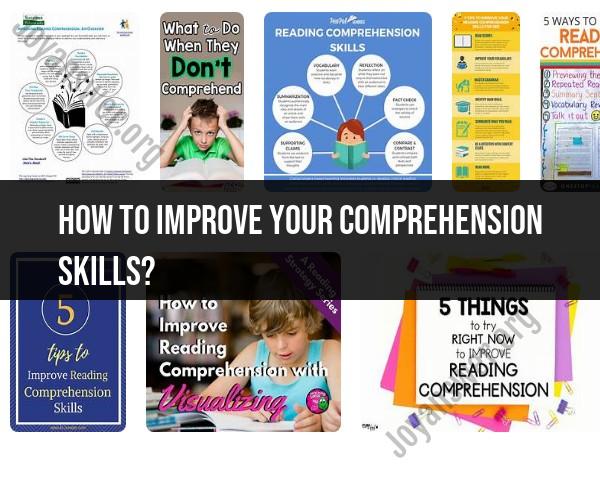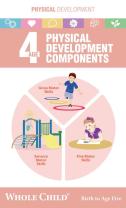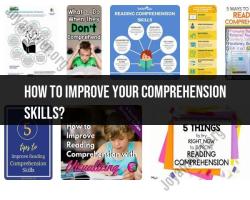How to improve your comprehension skills?
Improving comprehension skills involves various strategies that can help enhance your understanding of written or spoken information. Here are some effective ways to improve comprehension:
Active Reading: Engage actively with the material. Use techniques like skimming, scanning, and previewing to get an overview before diving into details. Take notes, highlight key points, and ask questions while reading to stay focused.
Vocabulary Enhancement: Expand your vocabulary by learning new words regularly. Use context clues and dictionaries to understand unfamiliar words encountered during reading.
Practice Summarizing: After reading a passage or text, practice summarizing the main ideas in your own words. Summarizing helps reinforce understanding and retention.
Ask Questions: Formulate questions while reading or listening to aid comprehension. Questioning helps you stay engaged and seek answers, improving your understanding of the material.
Visualization Techniques: Create mental images or diagrams of the information you're trying to comprehend. Visualizing concepts can enhance understanding and memory retention.
Active Listening: When listening to lectures, podcasts, or conversations, practice active listening. Focus on the speaker's main points, take notes, and ask for clarification if needed.
Use Multiple Sources: Consult various sources on the same topic to gain different perspectives and a deeper understanding of the subject matter.
Retelling or Explaining: After reading or learning something new, try to explain it to someone else or summarize it aloud. Teaching or explaining reinforces your understanding.
Chunking Information: Break down complex information into smaller, more manageable chunks. Organize content into sections or categories to aid comprehension.
Review and Reflect: Take time to review what you've read or learned. Reflect on the key points and how they relate to what you already know.
Practice Regularly: Regular practice is essential for improving comprehension skills. Dedicate time daily to reading, listening, and engaging with various types of texts or materials.
By incorporating these strategies into your learning routine and being consistent with practice, you can gradually improve your comprehension skills and better understand the information you encounter.
Enhancing comprehension skills is crucial for effectively processing and understanding information. Strong comprehension abilities are essential for academic success, professional development, and personal growth. Here are some strategies to enhance comprehension skills:
Active Reading: Active reading involves engaging with the text by annotating, summarizing, and questioning. This helps to focus attention, retain information, and identify key points.
Previewing and Predicting: Before diving into a text, preview headings, subheadings, and introductory paragraphs to get a general overview. Use this information to predict what the text is about, making connections to your existing knowledge.
Identifying the Main Idea: Determine the central theme or message of the text. This helps to organize the information and understand the author's purpose.
Summarizing: After reading a section or chapter, summarize the main points in your own words. This helps to solidify understanding and identify areas that require further clarification.
Asking Questions: Raise questions about the text to stimulate deeper thinking and uncover hidden meanings. Consider the author's perspective, purpose, and intended audience.
Using Context Clues: Utilize surrounding words, phrases, and sentences to infer the meaning of unfamiliar terms or concepts. This helps to expand vocabulary and enhance understanding.
Visualizing and Mapping: Create mental images or diagrams to represent the information in the text. This helps to organize and connect ideas, making them more memorable.
Re-reading and Revisiting: Re-reading difficult passages or reviewing key concepts reinforces learning and enhances comprehension.
Discussing and Debating: Engage in discussions or debates about the text with peers or instructors. This helps to clarify ideas, challenge perspectives, and gain deeper insights.
Seeking Additional Resources: Consult dictionaries, encyclopedias, or online resources to clarify concepts or expand knowledge on specific topics.
Additional Exercises and Practices:
Reading Comprehension Worksheets: Practice answering comprehension questions based on various texts to improve reading comprehension skills.
Cloze Tests: Fill in missing words or phrases in a text to test understanding of context and vocabulary.
Summarizing Exercises: Practice summarizing texts of varying lengths and complexity to develop concise and accurate summaries.
Graphic Organizers: Create graphic organizers, such as concept maps or flowcharts, to visually represent and organize information from the text.
Note-taking Strategies: Develop effective note-taking techniques to capture key points, identify connections, and enhance comprehension.
Reading Aloud: Reading aloud forces slower reading and promotes attention to detail, improving comprehension and fluency.
Reading Variety: Explore different genres and styles of writing to expand reading horizons and enhance comprehension skills across various contexts.
Background Knowledge: Read widely on related topics to build background knowledge and make connections to the text, enhancing understanding.
Seek Feedback: Share your comprehension strategies and seek feedback from experienced readers or educators to refine your approach.
Consistent Practice: Dedicate time each day to reading and practicing comprehension strategies to develop strong and lasting comprehension skills.




